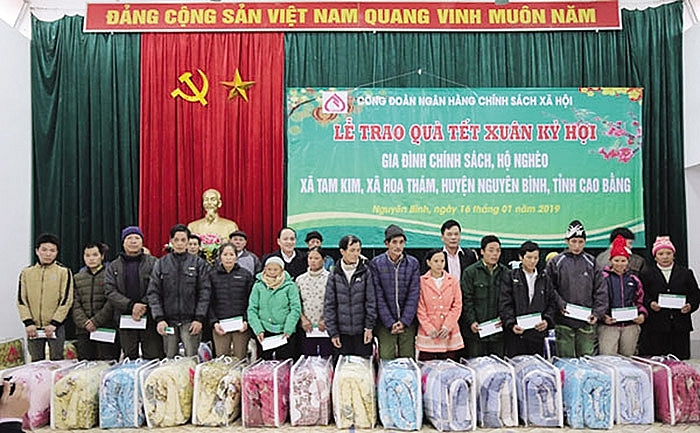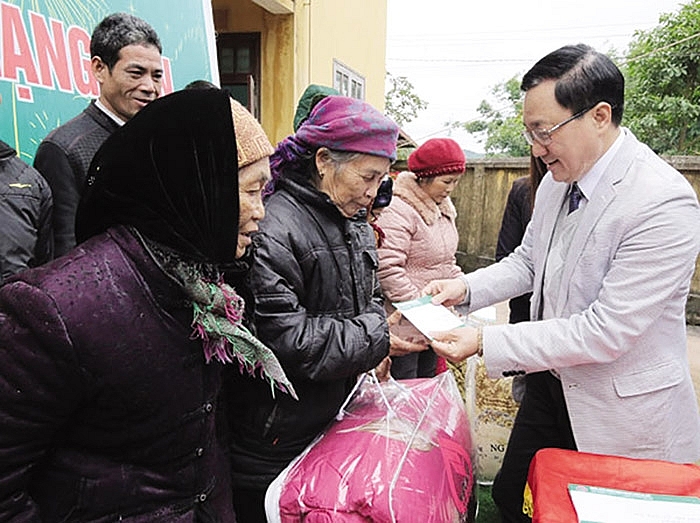VBSP brings new spring to poorer households
 |
| VBSP continues striving for sustainable, inclusive development with this year’s Tet programme |
The working group of the bank (VBSP) led by general director Duong Quyet Thang arrived to Nguyen Binh district in the northern mountainous province of Cao Bang province and Dinh Lap district in the neighbouring province of Lang Son ahead of the lunar New Year to present Tet donations to local poor households and policy beneficiaries.
The gift packages came to the hands of hundreds of needy households in the districts to bring warmth to people in this northern upland region.
Last year in Cao Bang alone, VBSP spent more than VND2 billion ($87,000) building a school in Thong Nong district, donating gifts to heroic Vietnamese mothers and veterans, and building houses for poor people, and tombs to worship the province’s martyrs who gave their lives to defend the borders, and more.
 |
| VBSP general director Duong Quyet Thang hands out Tet donations |
The bank’s Trade Union has completed a wide range of social welfare programmes valued at more than VND27.6 billion ($1.2 million) to pay tribute to people who have contributed to the revolutionary cause and to support the life of needy families and policy beneficiaries.
Ly Kiem Hin, a resident in Na Hoang hamlet in Tam Kim commune of Cao Bang, said, “On normal days, our people are given loans from the bank for production and business, then the bank staff teach us how to improve the efficiency of planting and husbandry practices.”
“On the occasion of Tet, the bank leaders themselves have come and given us many gifts. We will do our best to leave behind poverty next year,” he said.
Tam Kim and Hoa Tham are two villages of long-lasting revolutionary tradition in Nguyen Binh district where diverse ethnic minority groups co-exist such as Dao, Nung, H’Mong, and Muong. As these villages solely live from agricultural production with difficult transport conditions plus poor and backward infrastructure, local people report low living standards with a fairly high rate of poor households.
By virtue of preferential credit policies towards poor households and those of ethnic minority groups facing difficult living conditions in mountainous areas, many households could take up loans to develop the household economy, from there improving their life and getting rid of poverty in a sustainable manner.
These include the family of Trieu Van Phia and Hua Thi Lien from Van Lang district in Lang Son, who received preferential credit to buy a machine to produce tofu and to raise pigs, and who have been constantly improving their living conditions ever since.
In another case, the family of Hoang Thi Bang in Hoa An district of Cao Bang made it out of poverty in late 2016. In 2017, Bang’s family borrowed VND50 million ($2,170) from the bank to buy two cattle for agricultural production. The family now enjoys significantly improved living conditions.
In light of the proper development orientations and solutions, credit for social policies have contributed a fair share to helping the northern highland provinces such as Cao Bang and Lang Son to successfully carry out the national target programme on sustainable poverty reduction and new-style rural area building towards 2020.
What the stars mean:
★ Poor ★ ★ Promising ★★★ Good ★★★★ Very good ★★★★★ Exceptional
Related Contents
Latest News
More News
- Banking sector targets double-digit growth (February 23, 2026 | 09:00)
- Private capital funds as cornerstone of IFC plans (February 20, 2026 | 14:38)
- Priorities for building credibility and momentum within Vietnamese IFCs (February 20, 2026 | 14:29)
- How Hong Kong can bridge critical financial centre gaps (February 20, 2026 | 14:22)
- All global experiences useful for Vietnam’s international financial hub (February 20, 2026 | 14:16)
- Raised ties reaffirm strategic trust (February 20, 2026 | 14:06)
- Sustained growth can translate into income gains (February 19, 2026 | 18:55)
- The vision to maintain a stable monetary policy (February 19, 2026 | 08:50)
- Banking sector faces data governance hurdles in AI transition (February 19, 2026 | 08:00)
- AI leading to shift in banking roles (February 18, 2026 | 19:54)

 Tag:
Tag:




















 Mobile Version
Mobile Version